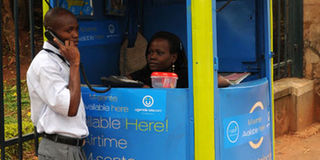Gaddafi ghost haunts Libyan assets in EAC

Uganda Telecoms is one of the Libyan assets in Uganda that government is grappling with releasing.
What you need to know:
The problem with Libyan assets in Uganda, Rwanda, South Sudan, Zambia and several countries in West Africa is that the Security Council is yet to establish if they were personal holdings of the Gaddafi family or belonged to the Libyan government.
Kampala
Nearly three months since the lifting of sanctions on Libya by the United Nations Security Council, uncertainty continue to dog the fate and ownership of businesses owned by Tripoli across East Africa. It has now emerged that the UN is still investigating these investments.
Two weeks ago, a committee of the Security Council was in Kampala to determine if the investments and assets that were acquired during Col. Muammar Gaddafi’s reign qualify for the lifting of sanctions so that they are “made available to and for the benefit of the people of Libya.”
Mr Donald Nyakairu, managing director of Uganda Telecom, a company in which the Libyan African Investment Portfolio (LAP) owns a 69 per cent stake, told The East African that the UN sanctions on the company have not been lifted. “The UN Security Council Committee was here two weeks ago and the sanctions on Libyan Investment Authority are still on in the member states,” Mr Nyakairu said.
The North African country used its oil wealth to invest outside Libya in the telecommunications sector in Uganda, Rwanda, Zambia, South Sudan, Sierra Leone, Ivory Coast, Niger, Guinea Conakry and Benin; it has interests in hotels, textile manufacturing and food processing in Uganda, as well as oil engineering and retail businesses in Kenya and Uganda.
Established with $5 billion worth of investment capital under General People’s Decree No. 15 in 2006, LAP was supervised by Libya’s sovereign wealth fund, the Libyan Investment Authority (LIA), which oversees the spending of oil dollars.
Of grave concern for the Security Council, however, is that LIA was controlled by the Gaddafi family and close associates of his regime. Hence, it is not clear whether LAP was a government investment vehicle or whether it was fused with the Gaddafi family holdings.
Thus Libyan investments in many African countries under LAP remain a subject of restrictions even after the US, UN and European Union have lifted sanctions
Lifting of sanctions
In December last year, the UN lifted sanctions on assets and financial institutions whose ownership was clear, top of these being the Libyan Central Bank, thus clearing billions of dollars that Libya held overseas to be unfrozen, easing the cash crisis for the new Tripoli government, the National Transitional Council (NTC).
The NTC has appealed to the Security Council in vain to have more Libyan assets unfrozen as the new regime grapples with the problems of reconstruction in a country whose infrastructure was badly damaged by Nato bombings.
East African states had earlier stated that they would hand over Libya’s assets to the NTC government once the African Union officially recognised it as the fully-fledged authority in Tripoli, which it was expected to during its recently concluded summit in Addis Ababa. However, the summit did not debate the issue as it could trigger more tensions between the AU and the UN.
Kenya holds on
In an interview last week, Kenya’s Foreign Affairs minister Moses Wetangula told The EastAfrican that the African Union has no mandate to decide the fate of the country’s investments.
“Libya invested in individual states and not the jurisdiction of the African Union,” he said. “As far as Libyan investments (in Kenya) are concerned, they remain protected, and nobody will misappropriate them.”
Mr Wetangula said Libya’s investment in Kenya belongs to a sovereign state and will only be handed over to NTC upon request.
By contrast, the Ugandan government, which enjoyed warm relations with Gaddafi’s Libya, is keen to hand Libyan assets to the NTC, according to State minister of Foreign Affairs Henry Okello-Oryem.
“Uganda in line with the UN Security Council, which is lifting sanctions on Libya’s assets throughout the world, is willing to return the Libyan companies, including utl and Tropical Africa Bank to resume operations normally,” Mr Oryem said.
“We have already informed the foreign ministry of Libya and it is up to them to decide when they are to start managing their business.”




